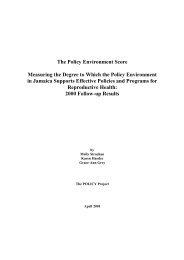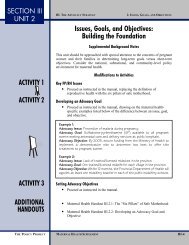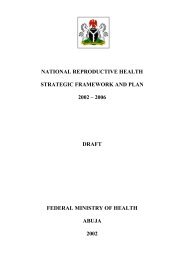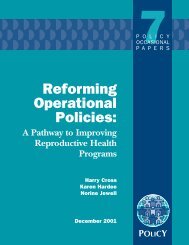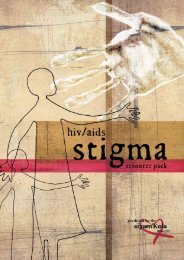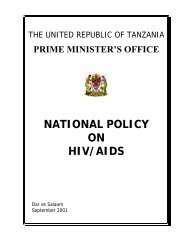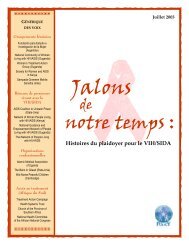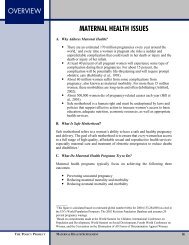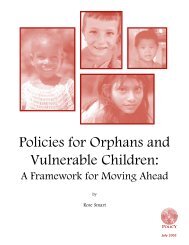THE OVC RAAAP FINAL REPORT - POLICY Project
THE OVC RAAAP FINAL REPORT - POLICY Project
THE OVC RAAAP FINAL REPORT - POLICY Project
You also want an ePaper? Increase the reach of your titles
YUMPU automatically turns print PDFs into web optimized ePapers that Google loves.
constraining intended <strong>OVC</strong> intervention outcomes. This information about current <strong>OVC</strong> responses is<br />
a unique data set, the first of its kind collected since the beginning of the epidemic.<br />
4. <strong>OVC</strong> Effort Index – An assessment of each country’s commitment and level of effort toward<br />
accomplishment of the five UNGASS <strong>OVC</strong>-related goals was conducted among national <strong>OVC</strong><br />
steering committee members by local consultants with assistance from <strong>POLICY</strong> <strong>Project</strong>. The survey<br />
served as a self-assessment of progress among key partners and stakeholders engaged in each<br />
country’s national response on behalf of <strong>OVC</strong>. It is a self-report of national effort to date.<br />
5. Community Responses – This assessment provided information about existing community responses<br />
to <strong>OVC</strong>, as extended families and communities provide the majority of support to <strong>OVC</strong>. It included<br />
identification of ways to strengthen the capacity of families affected by HIV/AIDS to respond to<br />
<strong>OVC</strong> and to participate in a comprehensive national response.<br />
Unit costs of essential services were measured separately with a 23-country UNICEF-funded survey.<br />
Local consultants interviewed major <strong>OVC</strong> service organizations in each country in order to collect cost<br />
data for components of each major <strong>OVC</strong> service area—food, healthcare, psychosocial support, financial<br />
aid/economic stability, education, and legal protections. The data captured unit costs among small and<br />
large organizations in both urban and rural settings. It is the first data set of its kind.<br />
Analysis and Action Planning: The input, process, and output data gathered and summarized within<br />
each of the five assessment tools were delivered to each national <strong>OVC</strong> steering committee for validation<br />
and analysis. In some instances, in-country consultants confirmed or added information to each tool and<br />
prepared analytic reports as a preface to action planning. The national <strong>OVC</strong> steering committees then<br />
prepared national <strong>OVC</strong> action plans to set priorities and identify financial and technical support for rapid<br />
scale-up of <strong>OVC</strong> efforts. The assessment tools and process also provided a framework for enabling<br />
countries to collect, assess, and routinely update their own data, and to make much needed improvements<br />
to their <strong>OVC</strong>-specific tracking and monitoring and evaluation systems.<br />
One of the outcomes of the analysis phase was to support national ownership of results and help to<br />
mobilize commitment to a scaled-up response on behalf of <strong>OVC</strong>. As a result of this investigation,<br />
governments are specifically using data from the <strong>OVC</strong> Desk Reviews to inform further development and<br />
implementation of draft or final orphan policies, and national <strong>OVC</strong> steering committees have integrated<br />
<strong>OVC</strong> Desk Review data into 16 of 17 national <strong>OVC</strong> action plans that identify key actions and priorities for<br />
addressing current gaps and constraints in programming scaled-up responses to <strong>OVC</strong>.<br />
3



